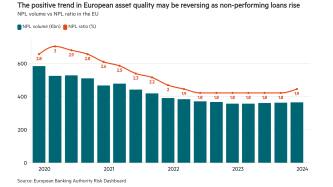In 2006, Germany recorded the fastest growth rate of its gross domestic product since 2000, at 2.7%. Importantly, growth is no longer driven entirely by foreign trade, but includes domestic investment, and profitability is improving following a period of serious corporate restructuring.
This year looks set to be another good one for investment banking and capital markets as well as for the economy, says Michael Heise, chief economist at the Allianz Group. “The economic environment is stable, corporates are looking to grow by means of acquisition and their financing needs are increasing, with a continuing shift away from lending to the capital markets.”
The German corporate bond market has finally woken up and is now one of the most vibrant sectors of European fixed income. Last year there were some landmark transactions, including Porsche’s €2bn deal – the largest unrated bond ever launched in Europe – and BASF’s two-tranche E1bn issue in June.
Hybrid appetite
The market has also emerged as a leader in innovative transactions. In 2006, a wide range of German companies tapped the hybrid market as a way of refinancing, while protecting investment grade credit ratings. About 50% of all hybrids undertaken in Europe in recent years have been undertaken by German issuers.
“Compared with certain other parts of Europe, especially the UK, dilution is a more sensitive issue in Germany given the high concentration of share ownership. Hybrid seems to provide the perfect solution,” says Ronan Donohue, head of hybrid capital at Dresdner Kleinwort. “In addition to ratings agency equity credit, which is the key driver of corporate hybrids, deals designed purely to obtain IFRS [International Financial Reporting Standards] equity credit have also been popular in Germany, particularly with certain non-rated mid-cap issuers.”
Hybrids are not the sole preserve of the biggest blue chip companies. In 2005, unrated retail group Otto blazed a trail with its hybrid transaction; in April last year, another unrated borrower, property company IVG Immobilien, raised €200m of perpetual hybrid capital in April in a transaction led by German banks Dresdner Kleinwort, HSH Nordbank, Sal Oppenheim and WestLB.
And German corporate issuance of hybrid capital is expected to remain buoyant, despite recent market volatility. “The subsequent spread volatility of hybrid capital has shown the execution risk associated with this product,” says Joerg Patzenhauer, head of debt capital markets at Dresdner Kleinwort. “However, market fundamentals are far from suggesting that institutional investors will take a more negative stance towards the product.”
Broad M&A pipeline
In 2000 and 2001, when the market witnessed the last burst of bond issuance in the German market, volume was dominated by telecoms and IT companies, financing heavy mergers and acquisition (M&A) investment. This time, too, M&A is a key driver of transaction volume, but the spread of M&A deals plots a far healthier pattern, says Berthold Fuerst, head of M&A for Germany at Deutsche Bank. “There is a big pipeline of M&A deals, but they are from right across the board – from auto and auto suppliers to chemicals and pharmaceuticals. There is not the same level of concentration as there was in the TMT [telecommunications, media and technology] boom.”
Mr Fuerst says that EU consolidation is a key driver for German M&A. “There is still a substantial gap between the market share of players in the US and those in Europe, and this is driving activity.”
The uptick in the German economy is also making German companies an increasingly attractive investment opportunity. “There is a lot more inbound investment, especially from Russia, China and India. Companies there are increasingly looking to European assets, and Germany will be very attractive,” says Mr Fuerst.
IPO and exits
Market participants expect the M&A and equity capital markets to be active in 2007. Dieter Pfundt, partner and head of Cologne-based investment bank Sal Oppenheim, says the firm is ideally positioned for forthcoming activity in areas such as real estate, industry and alternative energies.
The family-owned bank is a growing force in German investment banking: it executed about 50 M&A deals in Germany and Switzerland last year, and is second only to Deutsche Bank in terms of German banks. At the end of 2006, it advised the supervisory board on the two competing takeover bids of about €1.36bn for Techem AG, the first time in German history that there have been two rival bids from financial investors.
“We are a powerful alternative to the bulge brackets. Although we increasingly execute bigger deals, our sweet-spot is for deals between €200m and €600m, and we believe there will be a lot of activity of that size across a broad range of industries in Germany going forward,” says Mr Pfundt.
When Mr Pfundt began building Sal Oppenheim’s corporate finance franchise in the mid to late 1990s, he laid the foundations through German privatisation, working largely on utilities and real estate transactions for federal government, states and cities. The forging of corporate finance relationships with the newly privatised companies – particularly those in real estate – bodes very well for a sector that many hope will provide a flurry of activity in the coming year.
Sal Oppenheim worked on 18 initial public offerings (IPOs) in 2006, including the real estate IPOs of Patrizia Immobilien, CA IMMO International and the IPO of Gagfah, a portfolio of 160,000 apartments for €853m for US private equity house Fortress Investment. Private equity exits will also play a key role in market activity.
“We expect real estate to drive a lot of activity in the coming year, as Germany will [launch] REITs [real estate investment trusts] in 2007,” says Mr Pfundt. Fortress Investment’s flotation of its Gagfah portfolio in October has been a signal to many that exits will be as much driven by IPOs as by M&A in real estate-focused private equity; but real estate will not be the only sector driving IPO volumes, stresses Mr Pfundt. “Other industry segments offer substantial IPO opportunities,” he says.
Real estate hopes
Real estate is definitely the sector that everyone is watching with bated breath. After a long time in the doldrums, the German market is increasingly buoyant. And it is big, with more than €1075bn in non-residential assets alone. Including residential property, Commerzbank estimates the total value of German property to be €7100bn. Pundits do not call it the sleeping giant for nothing. More than 70% of companies still own their real estate (versus 25% in the US), and 3.3 million flats are owned by the government.
With the long-awaited launch of German REITs, this means that there is clearly a great deal of value to be unleashed. Much activity is expected, even if REITs have been somewhat emasculated by misguided political intervention, which excludes residential property from the legislation in the name of tenant protection. (This contradictory stance ignores the fact that REITs can include protective covenants and the reality that property owners are allowed to sell property – and are doing so – to private equity firms such as Fortress.)
REITs liquidity
If real estate is helping to boost IPO volumes, bankers also expect the REITs market to add liquidity and a further dimension to the depth of the equity market. “Even without residential property, this is a very important development for Germany,” says Roman Schmidt, head of corporate finance at Commerzbank in Frankfurt. “We have seen IPOs from real estate companies, but there are still relatively few opportunities for investors to gain exposure to German real estate via the stock market. And there is a great deal of liquidity – in Germany and from abroad – seeking investments. Increasing demand, restricted supply and a wall of liquidity are a recipe for rising prices.”
No wonder market participants are getting hot under the collar. In other countries, dedicated investor bases quickly emerged following the introduction of REITs markets. In the US, REITs’ market capitalisation rose from $32bn in 1993 to $330bn in 2005, a growth of 930%. “This market has the potential to unlock a great deal of value for German companies,” says Mr Schmidt. “According to Commerzbank research, average property assets in German companies represent 13.7% of the Dax 30’s market capitalisation, so the ability to release value via REITs will therefore offer a potential boost to other sectors in the stockmarket.”
And it is a great opportunity for Commerzbank, he adds. “We possess all the expertise to capitalise on the opportunities represented by the launch of REITs. We can warehouse assets, provide the financing or manage the IPO.”Ronan Donohue, Dresdner KleinwortDieter Pfundt: alternative to bulge bracketsRoman Schmidt: recipe for rising prices











